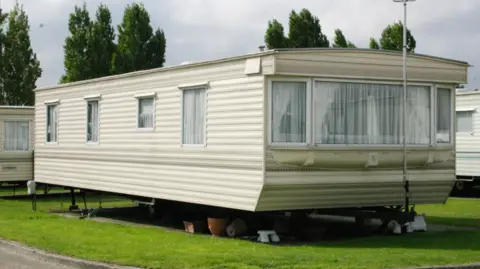The issue of park home residents losing a significant portion of their equity upon selling their homes has gained considerable attention, leading to widespread calls for legal reform. Sir Keir Starmer, the leader of the opposition, has come under fire to review a law that requires owners of mobile homes to surrender 10% of their sale profits to park site owners. This situation has been described as “legal theft of equity” by campaigner Sonia McColl, who represents approximately 200,000 park home residents across England. McColl’s initiative emphasizes the plight of numerous retirees who often sell their homes to fund care needs, while site owners continue to profit from the sales.
Last week, Dame Sonia McColl delivered a petition to 10 Downing Street, which has garnered 37,000 signatures, underscoring the urgency of the matter. During her advocacy, she highlighted how site owners are effectively profiting from the struggles of vulnerable individuals. Many park home residents, primarily retired individuals, are pressurized into selling their homes due to deteriorating living situations or the need for financial support for elderly care. McColl articulated the harsh reality that while residents are attempting to safeguard their limited equity, the site owners are reaping ongoing profits from the transactions.
The law in question imposes a hefty fee on park home residents selling their properties, with the charge amounting to 10% of the sale price, a figure that could reach up to £50,000. This fee is charged in addition to the annual rent and maintenance costs residents are already obligated to pay. Over the past decade, Dame Sonia has tirelessly fought for reforms, only to face repeated delays as political leaders have sidelined the issue. However, she is optimistic that the current political landscape, with new MPs entering the fray, might lead to more decisive actions.
For many residents, this transition to care facilities or new living situations is hindered by the financial loss incurred due to the 10% levy. Dame Sonia raised concerns about the burden this creates on local councils when residents can no longer afford the necessary services for their care. Her sentiments reflected the anxiety many feel as they face the prospect of being trapped in a home they can no longer financially maintain.
In light of the growing advocacy, a spokesperson from the Ministry for Housing Communities and Local Government has recognized the longstanding concerns regarding this segment of the housing market. The spokesperson confirmed that the government is currently reviewing the commission fee levied on residents during home sales. However, further details on potential reform measures will be released in due course.
Support for the campaign has come from various members of Parliament (MPs), specifically those involved with the Park Homes All-Party Parliamentary Group (APPG), who have gathered to listen to the residents’ experiences. Joshua Reynolds, the Liberal Democrat MP for Maidenhead, articulated that park home residents face unfair treatment compared to traditional homeowners. He pointed out that profits from the sale of a leasehold flat, for instance, are entirely retained by the seller, unlike with park homes where site owners benefit significantly.
Dr. Ben Spencer, a Conservative MP for Runnymede and Weybridge, voiced his concerns, questioning why site owners should profit from investments made by residents in their park homes. Both Reynolds and Spencer align in their belief that changes need to be made to treat park home residents more equitably in comparison to conventional homeowners.
While Labour housing minister Matthew Pennycook was unable to attend the recent discussion, he has previously engaged with campaigners, including Dame Sonia, around the pressing need for legal reform. The British Holidays and Home Parks Association (BHHPA) has been approached for commentary regarding these developments, showcasing the controversy’s multifaceted nature.
As the momentum for legal reform continues to grow, park home residents are left hopeful that their pleas will finally bring about meaningful change and equity within this specialized segment of housing. The pressing nature of their situation calls for immediate action, and many advocates remain committed to ensuring their voices are heard in Parliament and beyond.



